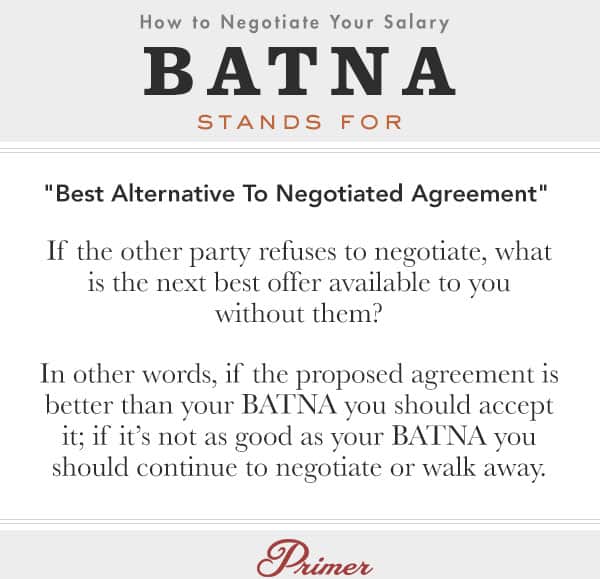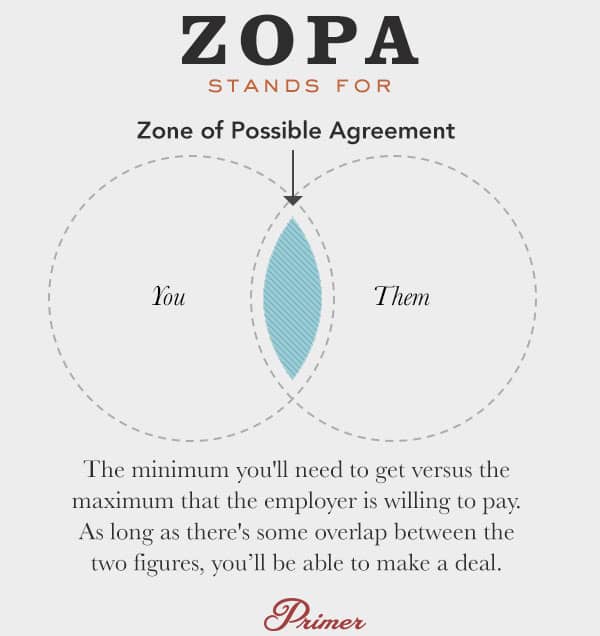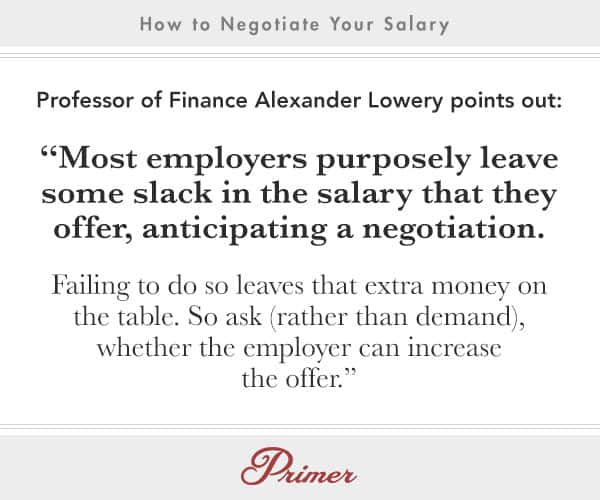
Job-hunting is practically a full-time job. After perfecting your cover letter, triple-checking your resume for typos, and networking until your face was stuck in a perma-smile, all that hard work has paid off: you’ve been invited to interview for your dream job.
Now it’s go time. But even experienced interview candidates often feel uncomfortable with one of the most important parts of any interview: salary negotiation.
It Feels Wrong To Negotiate. It Isn’t.
Is it ok to negotiate your salary? 84% of employers expect potential new hires to negotiate their salary. So what’s the issue? Talking about money feels awkward. It’s one of the big taboo topics, right up there with politics and religion. And asking for more money feels…weird. Ungrateful, somehow. Like the job itself isn’t good enough. Right?
Wrong.
Again, the overwhelming majority of companies expect their interview candidates to negotiate, not accept the first offer. We’re not saying you should bark, “one MILLION dollars, and that’s final!” But you should have a figure in mind – one that you can back up and defend with supporting data.
Like many aspects of the job search process, negotiation is a skill. And with a little practice, you can improve your negotiation techniques, maximize your salary (and other benefits) and make sure you’re getting your true value as an employee.
We sourced techniques and strategies from a number of industry experts:
- Hiring manager Steven Wang
- HR consulting firm CEO & founder Joshua M. Evans
- Attorney and negotiation expert James Goodnow
- Behavioral psychologist Dr. Elliott B. Jaffa
- Recruiting firm co-founder Sami Ahmed
- Professor of finance Alexander Lowry.
Their tried and tested rules can help you get what you want and need when engaging in salary negotiations.
Salary Negotiation Tips & Tactics
Be ready to walk away.
If a company can’t offer you a liveable wage, thank the hiring manager for their time and leave. We’re not saying just get up and go (there are other benefits that could make up the difference), but you need to shift your mentality from “I want this job” to “They want me. Do I want them?” The salary offer and how the negotiation is handled should help answer that question.
Those on the other side of the desk often call this the “BATNA” – the “Best Alternative To Negotiated Agreement.” A fancy term for “walk away point,” the term first showed up in Getting to Yes back in 1981 which is pretty much the bible of negotiation and shows up in just about every negotiation and conflict management class. If the employer refuses to negotiate, what is your best alternative option? Your BATNA is the best you can do without them.
While we’re tossing around industry jargon, here’s another important acronym you should know: the “ZOPA” or “Zone of Possible Agreement.” Calculate your personal Zone by comparing the minimum you'll need to get by with the maximum that the employer is willing to pay. As long as there's some overlap between the two figures, you’ll be able to make a deal. And knowing the difference between your number and theirs will generally give you an idea of how much wiggle room there's going to be when you actually sit down at the table.
Don’t forget, you’re interviewing the company just as much as they’re interviewing you. This is also your opportunity to understand how decisions are made at your potential new employer.
Know before you go.
Hiring manager Steven Wang recommends being cognizant of how much you're worth and what the average pay is for the position you're applying for. That way, you'll not only be able to spot a low offer, you'll also be able to use that information as part of your argument for why you should be paid more.”
Sites like Glassdoor and Indeed list salary ranges, but if you want to be sure that you’re getting the most up-to-date salary information, try mining your network for info. Reach out to friends and ask if they can give you a ballpark figure (again, fight that taboo). See if there are any employers in the same field/location who might be willing to conduct an informational interview, and ask about salary information.
Another resource: the career center at your alma mater. Campus career coaches often have pretty good connections with companies – even if you’re not a recent grad, they may be able to help you out.
It’s one thing if you’re the one applying for the job – you may not get to the salary question until after you’ve received a job offer. However, if you are contacted by a recruiter or hiring manager and asked to apply, you can ask if they’re willing to share any potential salary information. This is a little ballsy, but it’s also considerate: if the salary is much lower than you’ll accept, you’re better off not wasting your time or theirs. Know your worth, and ask for it firmly and politely.
Joshua M. Evans, founder of a boutique HR consulting firm, notes, “Negotiating is essential to making sure you maximize your worth to an organization. Setting a high starting salary will help in future negotiations internally once you get the job.”
Make your argument with data.
Numbers and industry standards should back up your counter-offer, not your personal requirements. Highlight the experience and skills you’ll bring to the company. Focus on your value. What can you bring to the company that makes you worth your weight in gold (or stock options)?
Sami Ahmed, co-founder of recruitment firm Hunt Club, agrees: “Show direct contributions to the business. When negotiating salary, it’s crucial to share your worth as it relates to net revenue of the company. Quantify those results and present them in a meaningful way.”
Think about more than just your paycheck.
There are many factors that affect your take-home salary. Attorney and negotiation expert James Goodnow says, “Always look to create value. Offer non-economic ways to sweeten the negotiation. Perhaps it’s things like work from home flexibility on certain days.”
In the HR world, this is called “expanding the pie”. And that’s just what you want to do. Negotiation is not a zero-sum game, where one person’s gain is equal to the other’s loss. You could stand to acquire some very valuable assets that “cost” your potential employer less than a higher salary.
So feel free to suggest other incentives: commissions, bonuses, benefits, more vacation days from the start, and other growth opportunities. Generous medical and dental benefits, life and disability insurance, and 401(k) plans with employer matching can add both money and value to your professional life and help you enjoy your personal time.
This is a key negotiating concept also featured in Getting to Yes: “interest over position.” Focusing on interest (needs/goals) over position (inflexible requirements) helps refocus your attention away from a “us vs. them” mentality and toward a satisfactory resolution.
For example, your “position” is a higher salary than the business is offering, but your “interest” may really be about increasing your quality of life. Flexible work options, more vacation days, and other types of benefits contribute to your interest without causing the business to increase your paycheck. On the other hand if your “interest” is that you need a specific salary to be able to pay your bills, no amount of vacation days is going to help.
It’s easy to villainize the company and imagine that in order for them to make a profit, we have to suffer. But if you can make the case that paying you what you’re truly worth will help them reach their ultimate goal, you can avoid conflict and find a mutually-beneficial solution.
Also, keep your potential employer in mind when negotiating benefits. A private-sector employer may pay a higher salary, but a nonprofit or start-up might have benefits and perks that make a lower figure worth it in the long run.
Don’t disclose your salary requirements.
Usually the interviewer will ask you what you’re looking for. Instead, try to get them to name a specific figure. Here’s how it might play out:
Scene A:
Them: “So what’s your current salary?”
You: “Uhhh…60,000.”
Them: “Great!” (They were going to offer you $65,000.)
Scene B:
Them: “So what’s your current salary?”
You: “I’d prefer to focus more on what value I can add to this company as a [marketing manager/ethnobotanist/butterfly wrangler/etc.]. However, if you’d like to discuss specifics, I’d be happy to hear the range you had in mind.”
You may receive a few more attempts to get you to name a figure first (aka “salary chicken”) but try your best to get them to throw out the first number.
Behavioral psychologist Dr. Elliott B. Jaffa has a good phrase for this situation:
“You must have a salary range in mind. I understand it is dependent on factors like education, experience, and the value I’ll bring to [company name]. Would you be kind enough to share that range?”
Don’t jump at the first offer on the table.
Yes, even if it’s within the range you deem acceptable. Be ready to counter-offer, either for a higher salary or additional benefits. Professor of Finance Alexander Lowry points out, “Most employers purposely leave some slack in the salary that they offer, anticipating a negotiation. Failing to do so leaves that extra money on the table. So ask (rather than demand), whether the employer can increase the offer.”
Once more, with feeling: Just because they offer a number doesn’t mean you have to accept it. Even if their offer is within the range you would accept, counter with at least 10% (maybe even 20%, especially in a higher cost-of-living area) above the initial offer.
Again, don’t be afraid to walk out.
Know what you’re worth and be polite about offers that aren’t worth your time. Most employers are prepared to negotiate. Very rarely, you may hear the maximum offer right away. There’s never any harm in asking if there’s room to increase the offer. You may get a higher figure, but if you don’t, not getting the job is better than working at a company that undervalues you.
Negotiators are made, not born.
Remember, negotiation is a conversation. A back-and-forth. Not an ultimatum or a monologue. And it will probably take some practice – maybe several interviews – before you feel comfortable trading figures with a hiring manager.
If you’re still nervous about negotiating, Professor Lowry has some comfort to offer: “Employers screen tons of résumés, spend countless hours choosing applicants to interview, devote a considerable amount of time to on-site interviews, and then select an applicant to hire. By this point employers are extremely invested in the chosen candidate. So candidates always have some bargaining power.”
Time itself is an effective tactic. Sorting through applications and holding interviews (and second interviews) is a massive investment of time and company resources. And as a result, an employer will be more vulnerable to negotiation than we might at first expect.
It’s easy to think of corporations as faceless, all-powerful beings, but in reality, there will be a person sitting across from you who wants to do their job and fill an open role. And the longer a position has been open, the more invested the employer will be in filling it.
So go into the interview with a positive, cooperative attitude. This is a chance to display your problem-solving skills and assertiveness. If nothing else, this is a learning experience that will be useful for future negotiations..

















